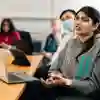



This is your chance to make a real difference to the next generation of thinkers, makers and dreamers.
Our innovative two-year degrees provide an opportunity to gain a first degree while focusing on your future ambition of becoming a teacher. This course is ideal if you're convinced you want to teach primary school children, if you're thinking of changing your career, or if you're looking to gain a specialist first degree.
You’ll explore curriculum, learning, teaching and what inspires young people to grow and flourish.
About this course
Be part of the lasting impact that education has on people's lives on this accelerated route towards a PGCE or taking on a teaching role in schools.
You’ll learn about education from many different viewpoints from across the world. Develop key communication and research skills. Examine education theory, research, policy and practice. And explore and specialise in your area of interest.
Opportunities to reflect on professional practice include a work-based module at the end of your first year. As well as visits to diverse learning environments such as mainstream and special schools, alternative provision, galleries and museums.
You’ll develop professional and practical skills in our Early Years Room and key stage one classroom space. You can also study towards an accredited Forest School certification. This prepares you to work outside with children and gives you a valuable extra qualification.
Our extensive network of 600+ education-related organisations and schools gives you invaluable learning experiences such as guest lectures and professional practice observations. As well as opportunities to take your placement in the UK or overseas.
By teaching, we learn.
Module options
Each year, you’ll study modules worth a certain number of credits, and you need 180 credits per year. Most modules are 20 credits – so you’ll study nine modules each year. Some longer modules, such as a dissertation, are worth more. In these cases, you’ll study fewer modules - but the number of credits will always add up to 120.
Filters
Introduction to Education
This module sets the scene for the programme, starting with your own background and experience and exploring what education means, how it differs from schooling and key concepts and approaches. It will also help you to develop the academic skills necessary for your degree programme.
core
20 credits
Exploring Values in Education
Education is highly values-laden. Whether considering children’s health and well-being, their safety, how potential is measured or developed, whether children should be taught in ability groups, how anti-bullying or relationships issues are explore in classrooms, issues can often be contentious and cause heated debate. This module will explore these issues and more, including social justice, sustainability, and “what matters” in education settings.
core
40 credits
Education Theory
This module explores the “Big Questions” in Education, drawing on key thinkers and theorists from across many periods of history and diverse locations across the globe. It will prepare you for undertaking your own research later in the degree, and provide broad horizons to challenge some of your preconceptions and expectations about education.
core
20 credits
Education in the Twenty-first Century
What would your ideal school look like? In the present day how would it be organised, what would be building be like, would it be actual or virtual, would there be rules? This module provides a creative and extended opportunity to explore a broad range of options and opportunities and to develop your own philosophical approach to learning and teaching.
core
20 credits
Reflective Practice 1
This module provides opportunity to engage in an extended period of work experience (paid or voluntary) and reflect on the learning environment in which you are based. Whether in a location local to home, or visiting a more distant place, there is flexibility to explore your interests as well as deepening your understanding of learning and children’s development to prepare you for applying for a teacher-training course.
core
40 credits
Education Specialism
Following focused input from your lecturers, this module provides the opportunity to explore a particular topic of interest to you, supported by a tutor. Whether you want to learn more about child development, pedagogy, approaches to behavior management or an aspect of the school curriculum, you will be supported to develop critical insights into real life practice.
core
20 credits
Reflective Practice 2
In this module you will hone your skills in reflective practice, reflecting on contributions from a variety of speakers and experts in addition to visits to a range of learning settings for children of different ages. This will include both formal and informal learning settings.
core
20 credits
Inclusion, Diversity and Equity
Inclusion is a broad term understood in many different ways. In this module you will consider its meaning in a variety of locations and contexts as well as at different times in history. Diversity, equality, equity, gender, age, identity, difference and special educational needs and disabilities will all contribute to the breadth of areas explored.
core
40 credits
Contemporary Issues in Education
Education systems and processes are continually changing: nothing ever seems to stand still! This module will support you to explore current issues and to develop your viewpoint and deepen your understanding drawing on the practical and theoretical learning you have gained in earlier modules.
core
20 credits
Our facilities



Watchlist
Kelly Dockerty
Course overview
2 mins
A degree that goes beyond the classroom
Course montage
1 min
Rewilding Reading
Course Highlight
9 mins
Life on campus
University life
2 mins
The Gold Standard for Teaching
University life
1 min
Featured academics
You'll benefit from the outstanding support of academic staff who are experienced education practitioners.
Our research is driven by the belief that education can challenge inequalities and injustices in society, and seeks social and educational change to enhance fairness, equity and social justice.

Kelly Dockerty
Senior Lecturer
Kelly has a background in science education and primary teaching. An active researcher, she created the Conversation Interfaces Personalising Learning in Initial Teacher Training Project (CIPLiITT), a platform for ITT students to share knowledge.

Dan Wray
Lecturer
Dan has 15 years’ experience in primary teaching, including senior leadership team roles. He was a local authority literacy leader and a Key Stage 2 Coordinator for mathematics, science, gifted and talented provision, and curriculum development.
Entry Requirements
What do I need?
This course is currently available through Clearing, which means our entry requirements are a bit different to what they would normally be.
At Hull, you're a name not a number. During Clearing, we look at all of your qualifications and experience, not just your academic grades. We may be able to offer you a place whatever your situation. Get started by completing our eligibility checker, and find out immediately if you could study at the University of Hull.
Have questions? Our admissions team will be happy to help.
Fees & Funding
How much is it?

Future prospects
After you graduate, you can go on to or start initial teacher training leading to Qualified Teacher Status (e.g. PGCE).
Graduates also pursue other postgraduate studies, work as home education tutors or education consultants, teach abroad, or take up educational roles in the arts, heritage or local government sectors. 96.2% of our students are in work or further study 15 months after graduating.1
Become part of the next generation of futuremakers
Like what you've seen? Then it's time to apply.
The standard way is to apply through UCAS. This will give you the chance to showcase your skills qualities and passion for the subject, as well as providing us with your academic qualifications.
Not ready to apply yet?
Visit our next Open Day, and see all that the University of Hull has to offer. Talk to our lecturers about your subject, find out what university is really like from our current students, and take a tour of our beautiful campus and amazing facilities.
You may also be interested in...
100% employability (Teacher Education) UK domicile full-time first degree leavers; Higher Education Graduate Outcomes statistics, for the academic year 2022/23, published by the Higher Education Statistics Agency June 2025.
Education is ranked Joint 1st in the UK for Value Added Score. The Guardian University Rankings 2026.
All modules presented on this course page are subject to availability and this list may change at any time.